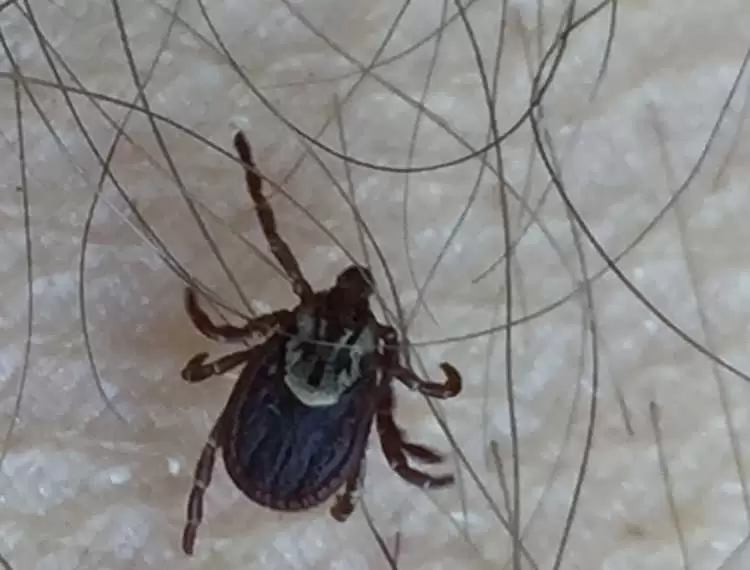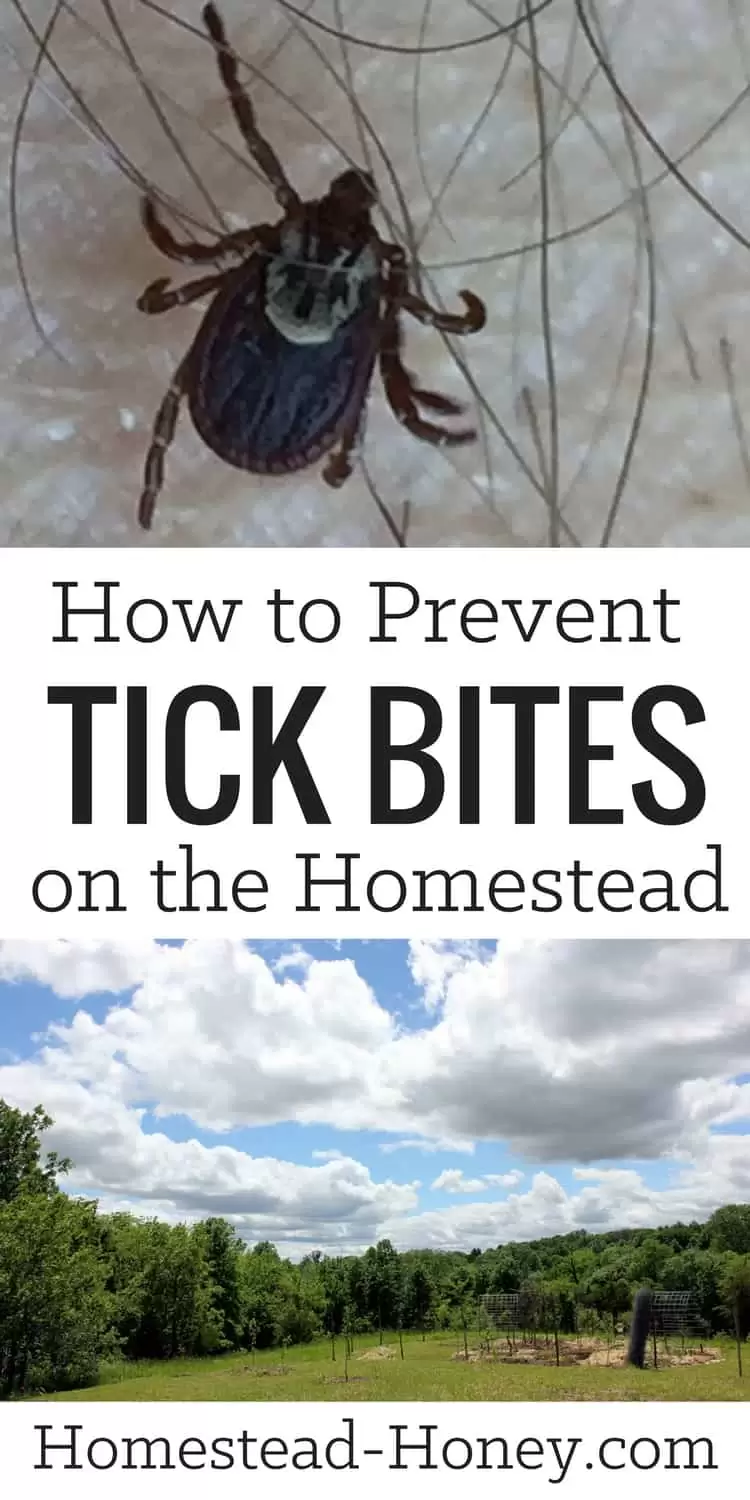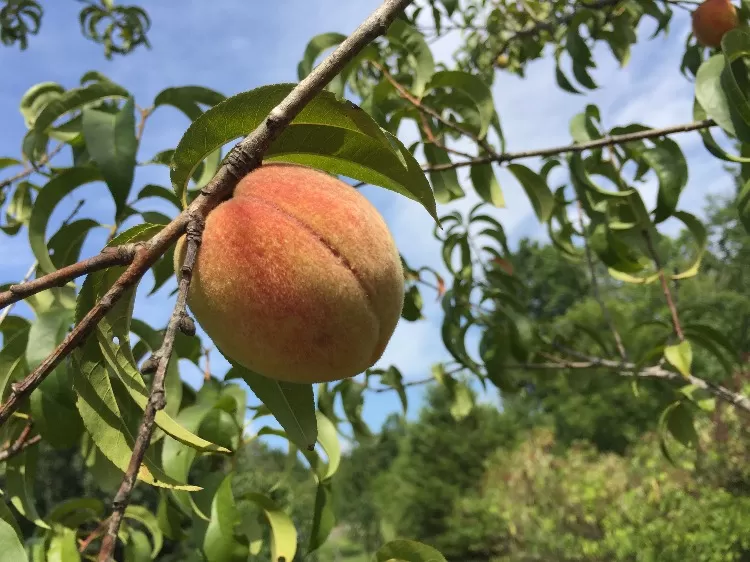I’ve seen a lot of posts on Facebook about this being a bad year for ticks. Ticks are no fun. In addition to being disease-carrying creatures, they tend to gross people out. Honestly, I’m immune to their ick factor, having pulled hundreds out of my family. But, I do give ticks a great deal of thought, and I thought I’d share with you our strategy for preventing tick bites on our homestead.
When we purchased our land it had been in the Conservation Reserve Program (CRP) for years. CRP land is taken out of agricultural production, and while certain management practices are allowed, like planting hardwoods, or mowing, it is essentially fallow. In our case, the non-forested areas grew up as dense meadows. When Spring, 2013 came and we began spending more time on our land, we’d generally come for the day, bring a picnic lunch, and work as long as possible. At lunch time, we’d spread a blanket down on the grass, and enjoy our meal.
That is, until tick season began.
When the ticks became active, we noticed that they were everywhere. We would place our blanket down on the grass, and within SECONDS, it would be covered with tiny, crawling ticks. When we sat on our outdoor sofa, we were constantly brushing ticks off the cushion
Our Tick Management Strategy
In our situation, camping on raw land while we built a house and homestead, we were unable to avoid ticks. My attempts at using herbal or natural tick repellents were almost laughable, and I do not feel comfortable using DEET on our skin. Since repelling ticks was not effective, we relied on three strategies to reduce tick bites: 1) Removing favorable tick habitat, 2) Allowing chickens to free-range our property and eat ticks, and 3) Checking ourselves frequently to ensure that ticks were not embedded.
Remove Favorable Tick Habitat
The first step in creating a livable homestead was to mow the prairie grass, and convert it to lawn. Luckily, my husband Brian loves to mow. Over the past three years, the wild meadow that was once our front yard has been converted to a very lush lawn. It is now rare that I see a tick in our immediate living area.

Let Chickens Eat Ticks
Our flock of free-range chickens has been incredibly helpful in reducing the number of ticks on our property. We allow them to roam all over our 10 acres during the day, locking them in their coop at night. Their range is really impressive; they enjoy eating flies out of the cow patties in the pasture, then spend a few hours scratching and pecking in the forest behind our house, and later on mosey out to the lawn for a bit of fresh grass, eating ticks along the way.
Some homesteaders recommend guinea fowl for tick management. While I do enjoy the beauty of guinea fowl, I have found them to be a bit too vocal for my liking. Chickens do the job just fine.
Check for Ticks Frequently
This is the most important part of our tick management system. And I’m going to get a bit specific here, but I think it’s important. Ticks will seek out nice warm areas of your body, which means that they are going to crawl to, and embed into your most private areas. Your underwear line, your armpits, in between your butt cheeks, under the scrotum, in the armpits, attached to the ear lobes, and in the hair line. We have found ticks in ALL of these places.
Each night, we strip down and do a thorough tick check. Even though we have lights in all of our rooms, we use a flashlight for better visibility. We methodically check each part of the body (it’s easier with a partner), and then do a hair tick check on the kids. While Brian and I have found ticks in our earlobes and neck line, we have never found one embedded in our scalps, whereas the kids get them in their hair & scalp quite frequently, probably because they are lower to the ground.
If we find a tick, we generally just pull it out with our fingers, crush it, and call it good, although the Center for Disease Control recommends using tweezers, and cleaning the area with rubbing alcohol, iodine, or soap and water. Luckily, we have never developed a rash, fever, or any other reaction to a tick bite.
For more reading about preventing tick bites, check out these resources:
Natural Tick and Lyme’s Disease Prevention
Natural Tick Repellents and Easy Tick Control Tips
What is your favorite strategy for preventing tick bites?
Share it in the comments below so we can all benefit!
Pin it for later:












We also live in Missouri about 50 miles west of KC on 10 acres. Our land was only maintained in what I call the yard and not that well. We have mowed and mowed and mowed. The pastures are now pastures, the yard a yard. But ticks are everywhere and have been worse each year. Winters are not as cold or long and little snow. So they pop out earlier and stay longer. We are still in the process of cutting back the encroaching woods. Chickens are coming soon. We also check the dogs/cat, besides ourselves. I have deet, but don’t use it. I do buy those new collars for the dogs and it works. Chiggers! They have been a annoyance since I was born. Our vet had a dog that had so many ticks it was paralyzed. They got the poor dog back to health….but no telling if it has permanent damage else where. Oh and vacuum your floors/carpet. One can hitch a ride and drop in the house. When we lived in KC we had them too, older neighborhood estabilished trees and people who didn’t poison their lawns. It isn’t just a country/woods problem.
I hope the chickens will help your tick problem, Martha. I think that they have been the biggest asset in our tick prevention. Oh, the chiggers!! They are horrible! Now, if someone could help me get rid of the chiggers, I would be so very grateful. We do our best to stay out of tall grass, rub our bodies with a towel, etc. but we have new chigger bites every single day. They are far worse than ticks, although less of a disease issue. Take care!
chiggers aren’t necessarily going to be more prevalent in tall grass. the main thing to remember about chiggers is that they cannot stand the sunlight. they stay in shaded, protected areas. so while there might be a few more in tall grass because it offers more protection, I have frequently found chiggers to be abundant in very short grass if there was plentiful shade.
the best prevention I have found for chiggers is the periodic rub-down of the body that someone else mentioned. if they don’t have time to fully create their horrible fluid-sucking flesh-tube, you get a much less intense bite. rubbing dislodges them quite easily, as does showering. good luck!!
Thanks for the tips, Rose! I am suspicious that I’m getting most of my chigger bites in my garden, which would seem counterintuitive because it’s full sun, but it’s the only place I regularly hang out and I’m COVERED with chigger bites this year!
Oh, and love your email address – I was just recently in a play in which my character had to use the word “Pulchritude” several times. 🙂
Hi, I read you landscaped your yard to get rid of their ideal habitat. I recently purchased overgrown rural land and I was wondering how you did it? I’ve tried a brush hog but it doesn’t actually cut the grass, only the bushes/prickers. Any ideas would be great. Thanks
We started with a brush hog – someone came out and did the whole property the fall before we moved onto the land. That had cut down the biggest brush. Starting as soon as the spring grass began to grow, we just mowed and mowed and mowed. It really does select for grass, and now we have a lovely lawn. But it took a lot of mowing!
Just recently read a comment by an old timer Texas cowboy who said putting sulfur powder in a doubled up old sock andd smacking it about your shoes and ankles and legs would prevent chiggers and ticks. Thats what the cowboys use to protect themselves out on the range. He said it is so simple, effective and such old time wisdom he thought everybody knew to do it. I plan on trying it.
Let me know if it works! That sure is an interesting tactic!
Great post! If you do find a tick attached, essential oils are helpful for removing them and also wonderful for cleansing the area to prevent virus- oregano, teat tree, lavender to name just a few.
Thanks for the tips, Krystal! I keep tea tree very handy on my pantry shelf because we use it so often!
Hi there,
After reading through your article and the comments, I was interested to do some more reading on the idea of the yarrow preventing insect bites. I came across this article promoting a tincture spray rather than ingestion that might be useful: http://www.thehealthyhomeeconomist.com/yarrow-insect-repelling-herb-stronger-than-deet/
Amber
Thank you for sharing that, Amber. I look forward to reading it! And I actually have yarrow growing right in the front garden.
When I first moved to NC back in the 80’s, my parent’s land was much as you described…we had horrible chiggers that first year as we cleared the land. But never a tick. Over the years, that changed. I couldn’t walk across our lawn without several ticks latching on. I hear similar stories from others – the tick populations seem to be increasing.
I have met so many people who developed lyme disease, some of them didn’t know they had it until they became debilitated with chronic lyme. (Herbalist Stephen Buhuner’s book “Healing Lyme” is both informational and frightening.
I tried making the herbal insect sprays and I agree, they weren’t that effective.
But since I started regularly eating yarrow (Achilliea millefolium) for it’s medicinal properties (bitter for digestive, menstrual issues, etc.) I have found that insects do not bite me – including ticks. For two summers, everyone around me is getting eaten by mosquitoes and I am left alone. I swear – eating a few leaves (fresh or dried) of yarrow daily has kept me free of insects.
That’s pretty amazing, Michelle! I don’t have any yarrow now, but it sounds worth trying!
It’s a good idea to write down the date of a tick bite, since symptoms may not show up for a long time. Detecting Lyme’s Disease is still somewhat elusive and lots of people are having problems getting a diagnosis.
Not everyone gets a rash or exhibits the same symptoms. I felt sore under my arm a few months ago and looked in a mirror and found a tick. It’s my guess he wasn’t there for very long, judging by his size. But I recorded the date just in case I need it as a reference point should something later develop.
I sleep with my dogs. Not a great idea during tick season. :o))
Great point, Carla. Thank you for adding this tip.
I’ve caught a fair share of ticks on my children (though luckily, never found an embedded one yet), and I notice it usually happens after they handle the cats (who live outside). Our chickens do keep the tick population down. Tick collars and periodically washing the cats with anti-pest shampoo (though they hate it) also helps.
That’s definitely worth thinking about – checking after petting animals!
You’ve given good advice. Chickens are awesome.
Thanks Laura!
Good information. That is what I love about chickens. We went one step further and took down all the fir trees close to the house, one of ticks favorite habitats. Any trip outside calls for a tick check. We have a designated jar full of rubbing alcohol to dispose of any we find. We try to be vigilant especially with the grandbaby.
That’s smart to have the jar of alcohol handy. I might have to try that!
Thanks for the great advice! My dog has had Lyme and I got bit last year (no Lyme luckily). Another animal that eats ticks is the possum so if you have those around like I do on my teeny tiny urban homestead where we aren’t allowed to have chickens they are a real benefit.
I read that about opossums recently and I was so surprised!! Thanks for reminding me!
I’m glad you addressed this topic – a little prevention goes a long way, esp. with Lyme disease.
We also dress to keep ticks off – socks tucked over our pants, shirts in our pants. And we use BioUD spray which has been shown in a couple studies to work as well as DEET. We put it specifically on our lower legs, around the waist and on our forearms.
We also frequently brush off during the day. Starting at the head and working our way all the way down to our ankles we vigorously rub/brush off our body. It’s simply a way to dislodge any we don’t see crawling up. While we don’t necessarily see ones flying off of us, it’s a simple way to minimize.
Finally, we also do a tick check. the flashlight is especially helpful since my kids and husband have dark skin.
Yes, and one more thing, many people don’t know that ticks can be active at all times of year. Unless its extremely cold they will come out to feed. I’ve found ticks in March and October.
Great points, Sarah! As chigger season approaches, we are also doing the frequent wipe downs during the day.
I grew up in the Sierra Nevada Mts. but never got a tick on me. The pastured horses were a different story and when they were brought in they all got a bath and were de-ticked. Ticks would get down in their ears and I remember the old cowboys pouring in turpentine to drive them out. Medicinal elixir Turpentine have been used medicinally since ancient times, as topical and sometimes internal home remedies. Topically it has been used for abrasions and wounds, as a treatment for lice, and when mixed with animal fat it has been used as a chest rub, or inhaler for nasal and throat ailments. Many modern chest rubs, such as the Vicks variety, still contain turpentine in their formulations.
I know that fleas dislike Cedar and Cedar oil is applied to ward them off. Maybe there’s some way to use Pine chip/sawdust or oil to ward ticks away too. I remember stories of how people and their animals wore around their necks pine “rosin” bags. This site has some good ideas. https://dengarden.com/gardening/How-to-Repel-Ticks-Naturally
Oh, the animal ticks are something else! We have these enormous “sheep ticks” that embed in the cows and they are horrific! Thanks for sharing your experiences!
Ah, ticks
I don’t miss them! I thought we had no ticks down here in southern Chile and was surprised to see a few on the bellies of my sheep as we were shearing. Not a big problem and I’ve never seen one on us. I grew up in Lyme, CT, the birthplace of Lyme disease and know a few people who have had it. I can’t believe how bad your tick problem was! It was never that bad back in Lyme!
I think our situation was worse because we were clearing raw land. When I go to friends’ houses, I don’t have to worry about ticks in their front yard. And now, our lawn is pretty clear of ticks, which is great.
We had five guinea fowl but predators took three. They are only vocal the first year until they get used to surroundings. First rate tick prevention.
Good to know that they get less vocal over time.